I survived! Opening Ceremony on May 12 (link here) and the Closing Ceremony on May 22 (link here). Both went reasonably smoothly, though Closing in particular was somewhat miraculous given that they were still building the stage on the afternoon of the ceremony, when we started rehearsing. Though I hasten to add that this is no reflection on my colleagues who were in charge of the staging. Mostly it’s just that these sort of events invariably have a tedious period of sport that happens between the Opening and Closing Ceremonies, which means you have set up the Closing Ceremony in about 36 hours. So the fact that we had a stage at all is amazing. If you do click through on those links I think you’ll find that these were two quite prop-heavy ceremonies, so I’m greatly relieved that we actually pulled it off.
Now we’re even finished the packing up and moving out of the Props Tent, leaving a week or so of sorting out files and reconciling budgets and going in late and going home early. And the weather is sunny and warm now so I suspect there may also be a measure of sitting on terraces with a cold beer. In other words, a bit of hard-earned down-time.
Last day at the stadium. And not a minute too soon.
However, with the clock running on my time in Baku, I still had a few things to tick off the list. So in preparation for my first two-day weekend in months I decided to enlist the help of the Intrepid Raul for another wacky adventure, this time to see the famous mud volcanoes near Gobustan, about an hour’s drive out of Baku.
I say world famous though really, who outside of Azerbaijan even knows what a mud volcano is? This is probably partly because about half of the world’s thousand-ish mud volcanoes are in Azerbaijan. Mostly they’re quite small and relatively docile protrusions caused by more of Azerbaijan’s famous stores of underground petrochemicals bubbling up to the surface. Astute GSWPL Readers will recall another instance of leaky flammables near Baku, though that one was a bit more dramatic. Unfortunately, mud volcanoes are decidedly petite and mostly don’t erupt dramatically or spew giant globs of earth miles into the air or disrupt the flight path of incoming aircraft (errr.. except sometimes… see below).
Tourists usually combine a trip to the mud volcanoes with a viewing of the much more famous petroglyphs at Gobustan, which I visited on my first sojourn in Baku. On that trip there wasn’t the time to tack on the Mud Volcanoes, and it felt like something that really needed to be seen. So trusting to Raul’s extensive experience of the local Baku buses, we set off on a sunny Saturday.
Despite Raul's encyclopaedic knowledge of Azerbaijan public transit, we were stymied partway there and had to resort to a taxi. This was, for me, a happy occurrence, because the last few months have been long and hard and I’m now generally inclined to grant myself whatever little indulgence comes along. So while I’m sure the hour on the local mashrutka would have been a culturally much more authentic, I was secretly quite happy to fork over the cash and be conveyed in relative luxury right to the target destination.
And how was the destination? It was kind of... other-wordly.
It really is an odd landscape. Apparently NASA scientists have concluded that Mars is a lot like this, geologically speaking. But with fewer Ladas parked nearby.
The mud volcanoes ranged size from really tiny - a few inches across - to about 15’ high. Not huge at all. And some are more active than others. Generally though, they look exactly like the picture that appears in your head when you hear the phrase “mud volcano”.
See? It’s got the bubbly bit in the middle, and the slow flow of stuff on the outside, and the characteristic slope-sided shape of something that’s been building up for ages.
The only thing that was lacking is the explosive eruption part though even that’s not strictly true. Azerbaijan's mud volcanoes appear small from the surface, but they sit on large reserves of gas and (according to Wikipedia):
"About 200 eruptions have occurred in 50 volcanoes in the territory of Azerbaijani Republic since 1810. Eruption of mud volcanoes is accompanied by strong explosions and underground rumbling. Gasses come out from the deepest layers of the earth and immediately ignite. A height of a flame over volcano reaches 1000 meters (Garasu volcano). Toragay volcano erupted 6 times from 1841 to 1950."
Apparently a huge eruption occurred in 2001, spewing mud and flaming gas into the air in an explosion that could be seen from 15 kilometres away. The fire was still burning three days later. And whole new islands have been formed in the Caspian when undersea mud volcanoes have erupted. Luckily, nothing quite that exciting happened when Raul and I visited. Though I did get a sort of fuzzy slo-mo video which, despite the lack of focus, is slightly mesmerising.
And our cab driver took a shot of me and Raul on top of the biggest of the not-very-big mud volcanoes
And then of course we had to take a selfie of me and Raul and the cab driver, whose name was Elvin. Or possibly Elman. But definitely not Elvis, despite the sunglasses.
Soon. So soon!

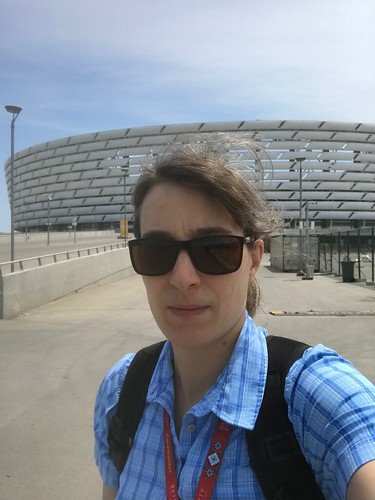
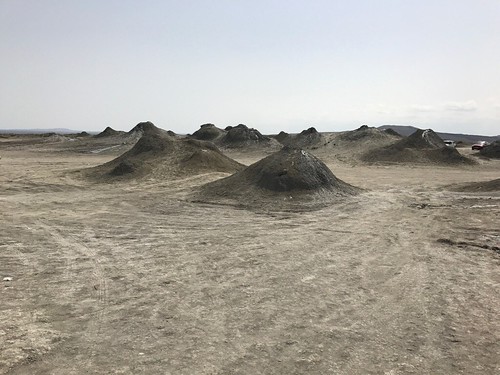
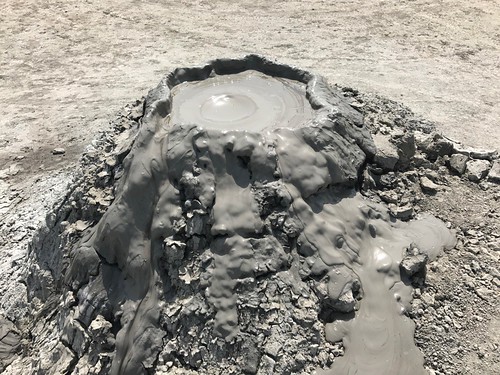
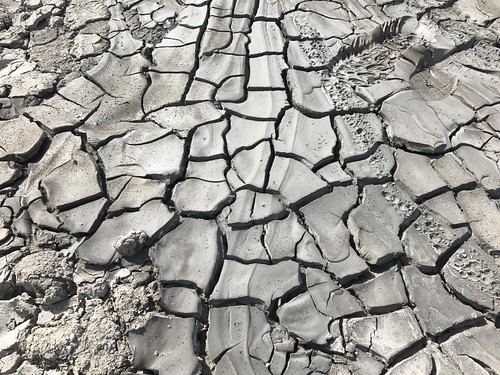
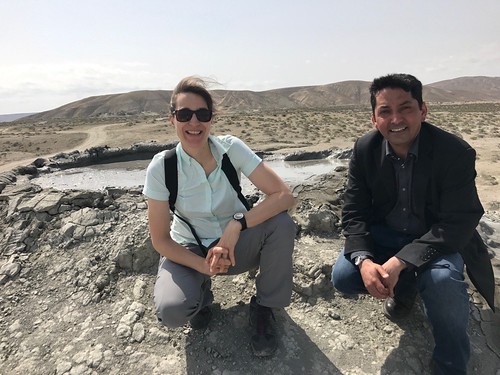
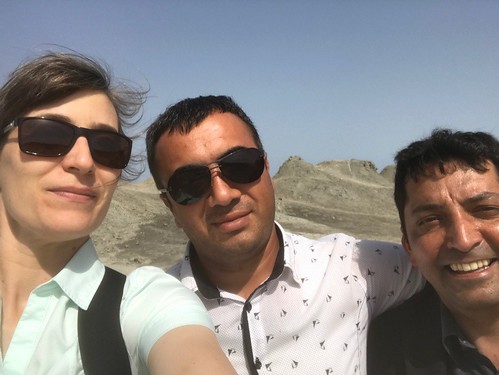


3 Comments:
Hey Pam. The links to the ceremony vids seem to take me to a google photo album of one of your mud volcano shots..? Glad to hear you survived another one - can't wait for more posts from London - if that's where you are are headed next. Be safe.
Hi Miles! Thanks for pointing out that mistake - it should be fixed now if you want to click over and see what I've been up to for the last nine months. And I'm happy to report I'm back safe and sound on the Lucky Nickel!
Yup...just a couple of your regular tiny low budget productions...nice.
We're loading in the "newly imagined" Phantom of the Opera starting today...it too is a really big shoe, with 18 trucks of fun! Happy to see that you are home on the boat for a bit. looking forward to further adventures as always...
Post a Comment